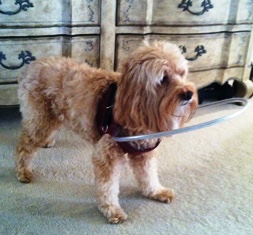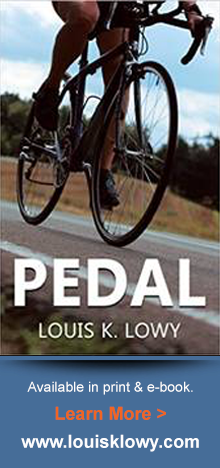Living With A Blind Dog
Blindness is the loss of vision in both eyes and can be caused by several things such as glaucoma, corneal problems, cancer, trauma, retinal diseases and cataracts. If your dog becomes blind, he may require extra care, but it is likely that he will continue to live a long and happy life. Just as humans adjust to the onset of blindness, so do dogs, and they learn to rely on their other senses.
Dogs live in a world of scent, and their sense of smell is their most refined sense. Have you ever noticed how your sighted dog acts when you are approaching him from a distance? He sees you immediately, and he stops and stares; but it's obvious that he doesn't know who is coming toward him. You start talking to him, perhaps calling his name, but he is still unsure, although he will act interested. Finally, when you get close enough to him so that he picks up your scent, he will run to you happily. Your dog trusts his sense of sight the least.
The dog's ability to hear is incredibly acute compared to humans. They can hear sounds over a wider range of frequencies and a greater distance than we can. Protection and guard dogs use their sense of hearing, along with their sense of smell, to detect possible intruders, sometimes from great distances.
Of course, at the onset of blindness your pet should be evaluated by your veterinarian as soon as possible. And you should minimize stress and injury by confining your pet to a safe area until the cause of the problem is determined.
At home you will have to help your pet adjust to his new sightless world. Here are some ways to help.
Be Patient
For pets afflicted with a sudden onset of blindness, it may take several weeks to adjust. Pets that have been losing their vision over time cope much better, as they have had time to adapt as their vision decreased. It is amazing how well pets deal with their blindness. In fact, it is not unusual for blindness to be discovered only after the owner buys new furniture or moves to a new home and notices that the pet is bumping into objects.
Because the senses of smell and hearing are amazingly well developed in dogs, they are much less dependent on vision than you would expect. For this reason, their behavior may return to almost normal once they adjust to their blindness.
Be Consistent
penny.jpgAmong other things, blind pets strongly rely on their memory to help them navigate through your home. The most important thing you can do for your dog is to keep things in the same place at all times. It is important that you be consistent.
For example, don't re-arrange your furniture. Pick up after yourself and instruct your children to do the same. Keep his normal path clear and don't leave things lying around that your pet can "bump" into. A misplaced laundry basket or pair of shoes or a toy can be a problem for your blind pet.
Always return things to the same place after you move them. This includes chairs moved during dinner or furniture moved for visiting company. Pets can bump into these objects easily, and this can cause injury or disorientation.
Maintain a consistent area for eating and sleeping. Keep your pet's bed and his eating bowls in the same place. This is especially true for his drinking water. Do not move these areas.
Be Helpful
Try not to carry your pet from one area to another, as this can confuse them. If they walk from area to area they remain more oriented. You might want to guide your dog through the house for a while until he gets his bearings. You probably know your dog's habits by now, so make sure he drinks enough and gets to the potty as necessary.
If your pet seems "lost" or disoriented, guide him gently by words or by leading him. Speak to him and encourage him to come towards you. When reorienting an animal, always lead him back to the same spot, such as the feeding area or bed.
Many animals use the small whiskers or vibrissae on their face and forehead as little antennae. These long whiskers are very sensitive and are good for detecting objects and picking up air currents. Be sure to leave these whiskers long, so that the animals can use them to detect objects before they bump into them. Ask your groomer not to trim these hairs.
Talk to your pet and use noise to arouse him when he is sleeping, rather than touching him. Many pets that cannot see you coming may be startled by your touch. Some dogs may bite when startled. Once awake, talk to your dog and touch him before picking him up.
Using a collar with a bell will help you know the location your dog.
Be Safety Conscious
It's important that you keep your pet safe. Take a look at your home for potential dangers:
Place barriers over hot tubs and around pools.
Remove or cover any sharp objects or edges, particularly those at eye level to the animal.
Block your pet's access to the fireplace, open stairways, balconies, decks and other potentially hazardous areas.
Make sure your pet is well identified. A collar and microchip are critical if your pet becomes separated from you. If lost, a blind pet will probably not be able to find his way home.
Identify your pet as being blind. Place a medical alert tag on your pet's collar that says that he or she is blind, and include your contact information.
Develop a Feeding Routine
Establish a known location for the food and water bowls and guide your pet to them if necessary. Try to feed your pet around the same time each day to help establish a routine. Call your pet or tap your fingers to the side of the bowl to help him recognize feeding time. This will help him "hone" in on the sound.
Supervise Outside Activities
Always accompany your dog outdoors or confine him to a safe, fenced area. A blind dog cannot detect danger and run from it, especially if attacked or chased.
Your dog should still go outside and enjoy a walk. Use a harness and leash to provide better guidance and control while walking. You need to be his eyes and watch out for things he might bump into.
Never allow your pet to roam free. Examine all fences, flower pots, gardens and outdoor surroundings for sharp areas or objects that could injure your pet. Minimize landscaping changes.
Stimulate the Other Senses
Blind pets rely on their other senses to help them function in their darkened world. Their ability to smell, feel and hear becomes finely tuned, and will be their main tool in orienting themselves to their environment.
Help your dog by talking to him when walking outside. Let him know when he is on the right track and let him know when danger is ahead.
Toys that make sounds such as balls with bells and squeak toys, or toys that have an odor (such as chew toys) provide stimulation and play time. Stimulate a pet's sense of smell and touch by providing an area to "sunbathe" or just get fresh air. Consider heating the food to increase its odor
For support and more information, also see http://halosforpaws.com/blog/living-with-a-blind-dog/


